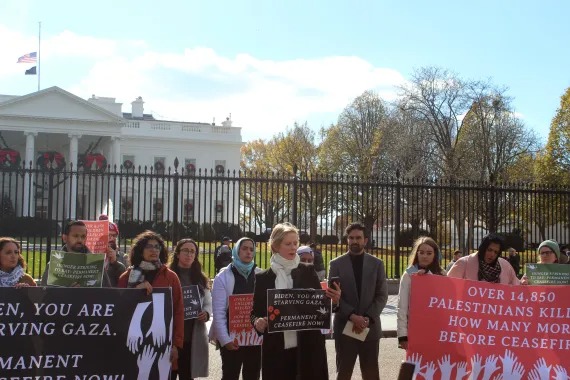In a bold move echoing the sentiments of many activists, state lawmakers, and Palestinian rights supporters, a group of individuals, including actor and progressive advocate Cynthia Nixon, has initiated a five-day hunger strike outside the White House. Their primary demand is a ceasefire in the ongoing conflict between Israel and Hamas in Gaza.
Background and Criticism of Biden’s Stance:
At a news conference on Monday, these activists strongly criticized United States President Joe Biden for his perceived support of the Israeli offensive in Gaza. They called for an immediate end to the hostilities, aligning with the growing chorus of voices, including artists, politicians, and government staff members, who have been advocating for a cessation of violence.
Despite widespread calls for a ceasefire, President Biden has maintained steadfast support for Israel, pledging over $14 billion in additional aid. Advocates argue that this financial assistance contributes to the Israeli military actions in Gaza, fueling the ongoing violence.
Public Opinion and Humanitarian Concerns:
The hunger strikers highlighted public opinion polls indicating that a majority of Americans support a ceasefire. They drew attention to the extensive destruction in Gaza, where over 14,800 Palestinians have lost their lives. United Nations experts have even warned that the conflict places Palestinians at “grave risk of genocide.”
Organizers Emphasize Diplomacy Over Bombs:
The hunger strike, organized by Palestine solidarity advocates, progressive Jewish groups, and Arab and Palestinian-American organizations, underscores the belief that diplomacy, not military actions, can be the solution to the crisis in Gaza. Despite a recent four-day truce, concerns persist about the potential resumption of hostilities once the pause ends.
Voices from the Hunger Strike:
- Cynthia Nixon’s Plea for Empathy: Cynthia Nixon, known for her work in “Sex and the City” and her political endeavors, appealed to President Biden’s empathy. She urged him to imagine the children of Gaza as his own and emphasized the need for a lasting ceasefire, asserting that “never again” should apply universally.
- Delaware Lawmaker Madinah Wilson-Anton: Madinah Wilson-Anton, a Muslim American legislator, expressed the majority sentiment among Americans for a permanent ceasefire. She called on President Biden and congressional members to prioritize the desires of the people.
- New York State Representative Zohran Mamdani: Zohran Mamdani highlighted the success of negotiations in securing the release of captives during the truce. He emphasized the hunger strike’s necessity in the face of what the participants see as a lack of responsiveness from the U.S. government.
- Activist Rana Abdelhamid: Rana Abdelhamid connected the violence in Gaza to a rise in prejudice against Arabs and Muslims in the U.S. She emphasized the link between anti-Palestinian rhetoric and incidents like the recent shooting of three Palestinian students.
- Palestinian-American Writer Sumaya Awad: Sumaya Awad underscored the complicity of the U.S. in the ongoing violence against Palestinians. She emphasized the hunger strike as a means to pressure the government to act for a permanent ceasefire.
The hunger strike outside the White House represents a poignant expression of dissent, bringing together individuals from various backgrounds to demand immediate action for peace in Gaza. As these advocates abstain from food, their collective voice grows louder, urging the U.S. government to reassess its position and prioritize diplomatic solutions over military actions in the Israeli-Hamas conflict.















